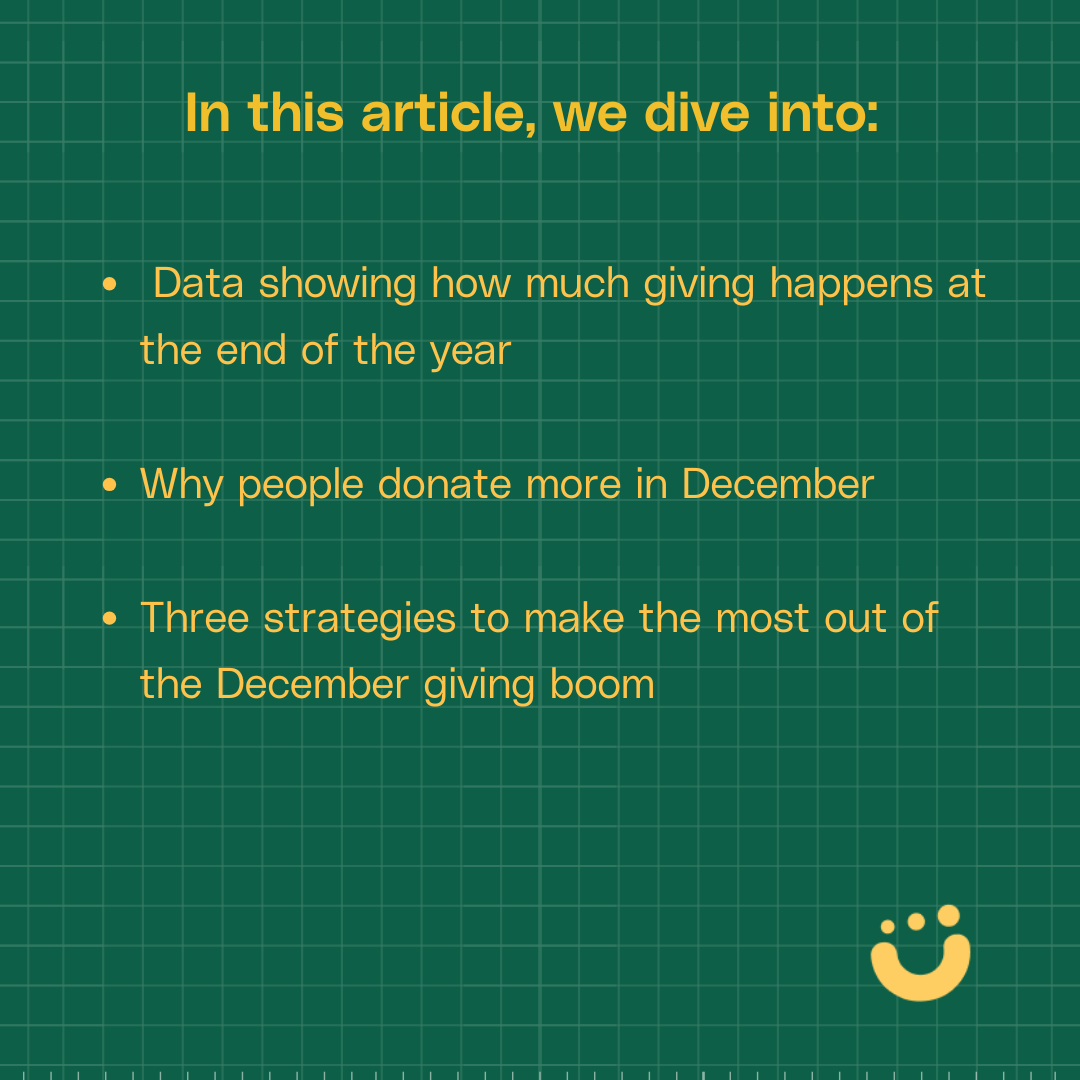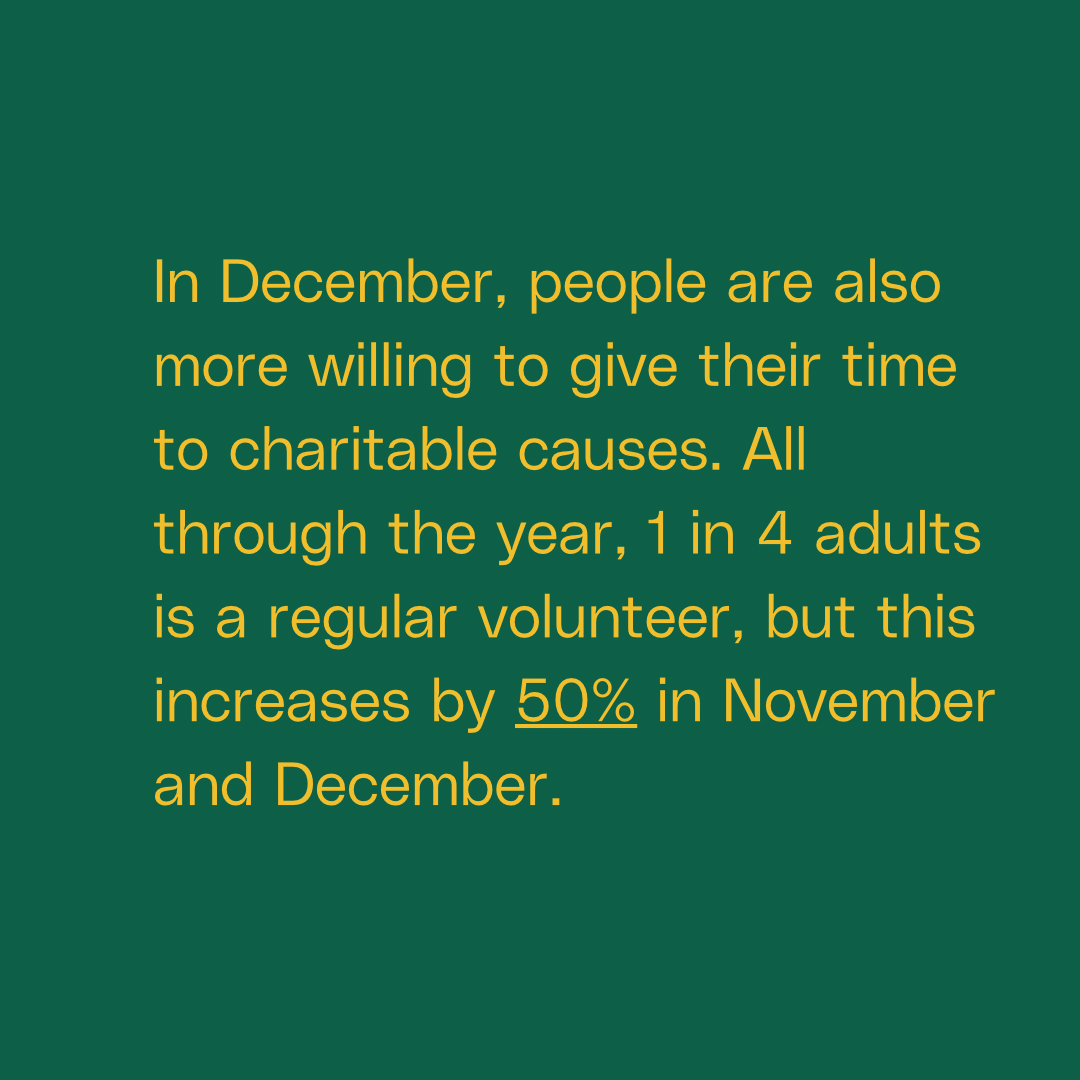Why December is a Crucial Month for Nonprofits
Here’s how your nonprofit can leverage the month of December — the most charitable time of the year — to boost donations.

As the year comes to a close, the last two months usher in the holiday season.
The good news for nonprofits is that the likelihood of people making charitable donations also increases by 14%. So much giving back happens in December that the month has become widely accepted as National Giving Month.
We look at some giving-season data. Then, we share strategies for maximizing this holiday season to raise funds and get volunteers.

Data showing how much giving happens in December
Generally, average donations to nonprofits rise in December owing to a 5% increase in donors.
About 12% of all charitable giving occurs on the last three days of the year. The last-minute donations are usually an attempt to catch a tax break.
People are also more willing to give their time to charitable causes. All through the year, 1 in 4 adults is a regular volunteer, but this increases by 50% in November and December.
In 2020, nonprofits received 22.7% of their online donations in December. By 2022, December online donations had increased to an average of 25%.

Why giving increases in December
There are various factors that act as motivation for participating in the giving season.
Religious holidays
There are major religious and cultural holidays occurring between November, December, and early January. We have Diwali, Christmas, Kwanzaa, and Hanukkah, all of which have a central theme of love and unity. It is the norm to show some form of generosity as part of celebrations.
Social influence
Asides religion, the messaging as the year ends tends to revolve around giving — Giving Tuesday, for instance, which is the Tuesday after Thanksgiving. Therefore, one possible factor in the surge in charitable acts is societal expectations. The fact that such acts boost positive self-image for individuals and enhance corporate image for businesses is perhaps why they're accepted and promoted.
More cash flow
Sometimes people are able to give more during the holiday season because they have more. Some people get salary bonuses, cash gifts, or break out their holiday savings. All in all, they have more to spend at the end of the year.
Tax breaks
In some countries, like the USA, the government uses tax deductions as an incentive for donating to charity. Businesses and individuals can get tax reductions if they donate to eligible charities. There are additional conditions that differ from country to country. One common term is that taxpayers must make the donations by December 31 to claim the deductions for that year. That's why nonprofits usually get a record amount of donations in the last three days of the year.
3 strategies for nonprofits to get the most out of the giving season
Create a holiday-themed campaign
Many charities run special campaigns during the holiday season. These campaigns are structured to evoke feelings of goodwill, gratitude, and generosity tied to the season. There are different festivals for different groups. To execute a targeted and impactful campaign, we would advise you to tailor your messaging and visuals to appeal to specific audiences as the celebrations roll by.

Leverage civic events to reach secular folks
Not everyone associates themselves with religion or cultural festivities. This doesn't mean they are out of your reach. Thanksgiving Day and New Year's celebrations are secular holidays that encourage giving back.
There are other civic events, such as Giving Tuesday (this year it falls on December 3rd), International Volunteer Day, and National Philanthropy Day. These provide ample opportunity and a wider audience to source funds and volunteers.

Use the power of partnerships
During the holidays, businesses tend to host more sales, e.g. Black Friday and Cyber Monday events, to encourage a shopping rush. A partnership to present your fundraising appeal to customers as they shop could be rewarding.

Conclusion
Timing is an important factor in nonprofit fundraising. The giving season is famous for being a time when giving back is a cool thing to do. From the data available, the best month for fundraising is December. November and early January are also important months to focus on.
